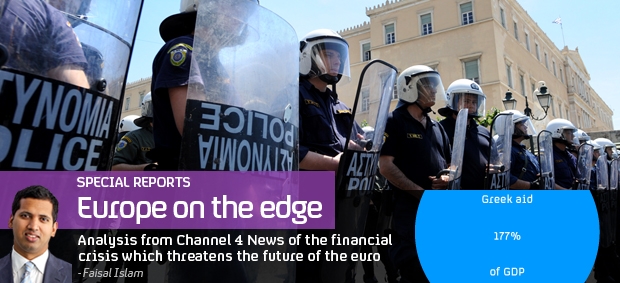Fear not hope as Greeks contemplate returning to the drachma
Athens, 11am
Syntagma Square’s spirit of rebellion was absent last night at the centre right New Democracy party’s final rally.
There were flares, dodgy dance music, and an attempt at an impassioned speech from Greece’s would be euro saviour Antonis Samaras. His money quote: “the first choice Greece must make is: euro or drachma?”.
The mood was not helped by some interference from Germany. The FT DEutschland, writing an open letter to Greeks, advising them to vote Samaras, and “resist the Demagogue Tsipras”. That went down like a bucket of hot tzatsiki among the ND faithful in Syntagma.
But what was remarkable was the expressions on the faces in the crowd. Not hope, but fear. As one ND candidate told me, “these are the faces of people wondering whether they’ll have to take their life savings out of the bank on Sunday night”. That is, if they have not already. Many in the crowd believe in one simple equation:
“Syriza win = bank run on Sunday evening”.
Obviously that is rather simplistic. But privately Syriza’s top advisers also acknowledge, that broadly Greece’s electorate is splitting in two: “those with bank accounts and those without” is the key difference between the opposing poles in this election, the establishment centre right party ND, and the upstart radical leftists of Syriza.

Where just a month ago no single party got more than 20 per cent of the vote, both these parties think, that with the right wind, they might start to approach 30 per cent tomorrow.
The public face of Syriza has certainly moved to the centre. I note what you might call the “Syriza shuffle”. A month ago, I was being told by two party figures that threats of a disorderly euro exit was Greece’s fundamental bargaining chip in a renegotiation of the EU loan agreement, what I call “Drachmail”.
Now they want to project far more pragmatism. The party says it will stick to some of the headline targets of the memorandum deal, but achieve them through tax rises, rather than spending cuts.
So that’s a significant moderation of views. However, Syriza’s leader still makes comments, as he did to Channel 4 News last month, suggesting that he believes it is impossible for Greece to be thrown out of the Euro, whatever Greece does, because of cold War style mutually assured destruction.
Right now, campaigning has finished. Athenians are heading to the shops and the beach. This election, and perhaps the integrity of the Eurozone, will be determined by 10 – 15 per cent of voters who are undecided right now.
This is a two part process.
First: are Greeks about to elect and “anti-memorandum” government?
But as important, will the hitherto eerily silent “Hellenosceptics” in Finland, Austria and Germany, use such a result as an excuse, a casus belli, to effectively kick Greece out?
As George Osborne suggested on Thursday, kicking Greece out could be the blood price for Austerians from north Europe accepting pooled sovereignty, fiscal and banking union that would make functional this dysfunctional currency union.
Next week could mark an unrivalled opportunity for a de facto forced Greece exit, that is de jure, impossible.
Follow Faisal Islam on twitter: @faisalislam
